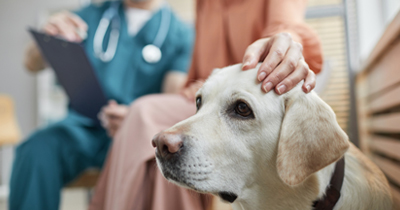Senior Pet Care: Navigating the Unique Health Needs of Aging Companions
 As our beloved furry friends age, their health needs evolve, requiring special attention and care to ensure they lead happy, comfortable lives. As they age, pets’ bodies and behaviors change just like those of humans. In this blog post, we’ll explore the unique health needs of senior pets and offer valuable insights to help you navigate this stage of their lives.
As our beloved furry friends age, their health needs evolve, requiring special attention and care to ensure they lead happy, comfortable lives. As they age, pets’ bodies and behaviors change just like those of humans. In this blog post, we’ll explore the unique health needs of senior pets and offer valuable insights to help you navigate this stage of their lives.
Understanding the Aging Process
Pets age and experience a variety of changes, just like people. Reduced energy, altered mobility, skin and coat quality changes, and behavioral changes are typical indicators of pet aging. To effectively address emerging health concerns in pets, owners must stay vigilant to any changes and work in close partnership with their veterinarians.
Regular Veterinary Check-ups
The benefits of routine veterinary examinations for senior pets are substantial. Veterinarians can monitor your pet’s general health during these visits, identify problems early on, and offer advice specific to your pet’s needs. These examinations frequently involve blood tests, dental exams, and other diagnostic screenings to guarantee a thorough understanding of your pet’s health.
Nutrition for Senior Pets
Their diet greatly influences senior pets’ health. As pets age, their nutritional requirements change, and they may benefit from specialized senior pet food. These formulations typically address joint health, weight management, and digestive concerns. For advice on the optimum diet for your senior pet, please speak with your veterinarian regarding their needs and current state of health.
Joint Health and Mobility
Senior pets often have joint problems and arthritis. Provide orthopedic beds, ramps, or stairs to facilitate access to elevated surfaces and support mobility. Additionally, your veterinarian might suggest joint supplements or medications to help with the pain and inflammation brought on by aging joints.
Maintaining Dental Health
For older pets, dental care becomes more and more crucial. Heart and kidney problems are among the many health issues that dental problems can exacerbate. At-home dental care, professional cleanings, and routine dental exams can significantly enhance the general health of your senior pet.
Mental and Emotional Well-being
Senior pets may experience changes in behavior, such as increased anxiety or cognitive dysfunction. For their emotional well-being, it is essential to give companionship, mental stimulation, and a regular schedule. Puzzle toys, gentle exercise, and interactive play can help keep their minds active and engaged.
Quality of Life
Ultimately, senior pet care aims to enhance their quality of life. Pay attention to your pet’s needs, proactively address health concerns, and cherish your shared moments. As they age, ensure they receive the affection and attention they deserve by changing your home to meet their needs better.
Caring for senior pets requires a thoughtful and comprehensive approach. Paying close attention to your aging companion’s evolving medical needs, giving them a healthy diet, and scheduling routine veterinary care, at Bloorkipling Animal Clinic, can ensure they have a happy and comfortable life. Embrace the journey of caring for your senior pet, and cherish the special bond you share.
